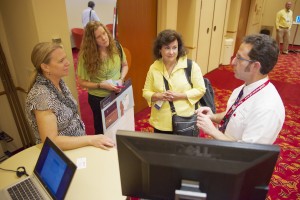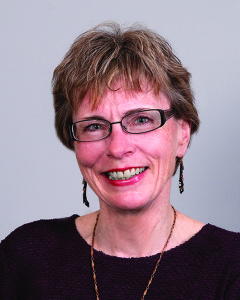Exclusive Interview With Les Howles and Kimary Peterson
2015 DISTANCE TEACHING & LEARNING CONFERENCE
Distance Education Professional Development
University of Wisconsin-Madison, Division of Continuing Studies
Editor’s Note: This year will be the 31st annual Distance Teaching & Learning Conference hosted by the University of Wisconsin-Madison’s Distance Education Professional Development (DEPD) group. Held in Madison, Wisconsin from August 11-13 this year, this event draws nearly 800 distance education and training professionals from around the world to share ideas, resources, research, and best practices. Also, please note that the current issue of the American Journal of Distance Education (Volume 29, No.2, April-June 2015) is devoted to a comprehensive introduction to the history and development of Distance Teaching & Learning Conference written by Mr. Howles, as well as sample papers presented on the occasion of the 30th anniversary of the conference in 2014.
Dr. Saba: What are some of the enhancements and additions that have been made to the 2015 conference? 
Mr. Howles: We’re expanding on a program enhancement from last year’s conference which includes a number of prominent invited guest speakers in addition to the keynote speakers. They’ll address emerging trends and topics in distance education that appeal to attendees at varying levels of experience, including advanced practitioners. For example, we’ve invited Nick Floro from Sealworks Interactive Studios to speak on designing mobile learning; Aaron Brower, provost and vice chancellor of University of Wisconsin Extension, to discuss the competency-based UW Flexible Option; Jonathan Finkelstein to talk about badging; and Penn State Prof. Michael G. Moore to explore trends and models in distance education.
Ms. Peterson: We’ve also designed this year’s Conference to provide more networking opportunities. It features an Emerging Topics Café so attendees have a place to converse outside of our formal sessions, whether to further discuss a topic covered in a session or address topics not included in the schedule. The Exhibit Hall, another hot spot for networking, is more than just a space for vendors; it will be a lively, interactive venue with presentations, showcases, ePosters and discussions. Early Bird Discussion Groups from 7-7:45 a.m. each morning will give enthusiastic participants a chance to meet each day around key topics before the formal program begins.
We’re expanding on a program enhancement from last year’s conference which includes a number of prominent invited guest speakers in addition to the keynote speakers.
Dr. Saba: Will you highlight some of the key topics and invited speakers for this year’s event?
Mr. Howles: We’ve selected speakers who push the boundaries, encouraging us to think about distance education in new ways. Marc Rosenberg will discuss learning ecosystems: an integrated learner-centered approach to designing learning environments that is reshaping the education and training landscape. Marc Prensky helped revolutionize education by arguing that teachers could reach “digital natives” through cell phones, videogames, and the Internet; he’ll share his latest ideas in his keynote titled “From Digital Natives to Digital Wisdom: Educating and Engaging Today’s Learners.”
Ms. Peterson: This year’s conference also emphasizes evidence-based decision-making. Several sessions address the topic of learning analytics which allow distance educators to make effective use of data. Prof. Sharon Derry of the University of North Carolina and Prof. Susan Rundell Singer, director of undergraduate education for the National Science Foundation, will explore practical applications of learning science research in distance education. Jack Phillips, chairman of the ROI Institute, will explain the value of evaluating innovations in teaching and learning focusing on quantitative measures of impact.
Mr. Howles: Several sessions focus on taking instructional design to a new level. These sessions build on the premise that designing a learning environment has become a team effort, with collaboration among faculty, designers, media specialists, and evaluators. And of course, we continuously stress the importance of evidence-based instructional design. For example, Tracy King will share current research in educational neuroscience as applied to online teaching and learning.
We’ve selected speakers who push the boundaries, encouraging us to think about distance education in new ways.
Dr. Saba: What do attendees like the most about the DT&L Conference?
Mr. Howles: People like the variety of topics in our 140 sessions, as well as the variety of presentation types. In addition to keynotes presentations, there are 10-minute speed sessions; informal discussion groups; three-hour preconference workshops for digging deeply into a subject; e-poster sessions, where people can browse computer stations to get the gist of a colleague’s work; and spotlight sessions, which mix presentations by prominent thought leaders with intimate onstage Q&As.
Our goal is that attendees leave the Distance Teaching & Learning Conference not just with theoretical knowledge, but with practical information. Our team works with presenters in advance to ensure that everybody comes away with new ideas they can apply in their work.
Ms. Peterson: Participants also appreciate the professional development that comes with the conference’s networking opportunities. They can talk face-to-face with others in the field who share their concerns.
Finally, our location is a major selling point. Madison is a heavenly place in the summer with its multiple lakes, Arboretum, farmers’ markets, nationally known restaurants, and a charming commercial corridor between the University of Wisconsin and the state Capitol. The conference venue, the Frank Lloyd Wright-designed Monona Terrace, is an architectural gem situated on a beautiful lake. Some attendees bring their families and take extra days before or after the conference to enjoy this one-of-a-kind place.
Dr. Saba: Thank you for an informative interview.









